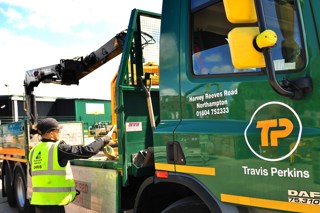MPs on the All-Party Parliamentary Group (APPG) for Road Freight and Logistics hear just 1% of drivers are under 25.
Industry representatives told the group that there is a shortfall of some 60,000 drivers and this could rise to 150,000 by 2020.
The oral evidence session was held as part of the APPG’s ongoing enquiry into the skills shortage in the industry. Those giving evidence were Kate Lester from Diamond Logistics, Mike Ponsonby from MA Ponsonby, Rod McKenzie from the Road Haulage Association (RHA) and Nick Bithell, who leads the Trailblazer Apprenticeship Scheme at the Institute of Apprenticeships and is also HR Director at Knights of Old Group.
MP Sir Mike Penning, chairman of the Road Freight and Logistics APPG, said: “Damning statistics like this show it is simply outrageous that Government are not responding to the very fair asks of the industry to address this problem.
“Without urgent intervention from the Government the industry is going to be in extreme distress.
“We need to get hard-working and ambitious young people into these jobs and we need to utilise the talent that’s out there.”
Penning explained that one in five (20%) people who leave the military have a HGV licence and leave with skills that are relevant to the industry.
“We need to work harder on schemes to make the industry more attractive to young people and to people who already have the skills we need,” he said. “It’s a win-win if we get this right.’’
McKenzie, managing director of the RHA, added: “In its current form, the Apprenticeship Levy is simply not working. The industry has paid in £280 million since 2017, and only been able to draw out £12m.
“The reason is simple, the Department for Education and the Institute for Apprenticeships are dragging their heels in approving the apprenticeship our industry needs. This is an industry that is working to the tightest margins and yet is being made to pay into a pot of money it can never access.
“Added to that, we have been waiting for over three years to hear whether the Department for Transport will back our Road to Logistics programme.
“We are asking for £1m to kickstart this valuable initiative to work side by side with funds from industry and yet we hear nothing back. We are just being passed from pillar to post.”
Commenting on reasons why the industry is struggling to attract new recruits Lester, CEO of Diamond Logistics, said: “Drivers are unfairly viewed as the pariahs of society and that needs to change.
“Our drivers are our ambassadors, they are an indispensable resource in our industry, an industry that is the lifeblood of the country.
“Government should be championing their contribution so that the wider public understand how vital they are and show them the respect that they deserve.”
Ponsonby reflected on levels respect not just from the public and Government but also at drop-off points. He said: “There have been occasions where my drivers have been refused use of the toilet at the delivery point. This is disgraceful and a clear breach of the ‘Welfare Regulations Occupier’s’ duty to visiting drivers.”
He continued: “We need more overnight parking and public toilets on the road network, because at the moment, this lack of public facilities is making drivers leave the industry, with few new drivers joining to replace them.
“Therefore, I would strongly urge the Government to invest in new facilities, as truck drivers are the unsung heroes of the road transport industry and keep supermarket shelves full.”
Commercial Fleet has previously highlighted how a failure to deliver safe, secure rest areas and address shortcomings in the apprenticeship levy were damaging efforts to tackle the driver shortage.
It also suggested that the cost of acquiring a HGV licence – some £3,000 – remains a major barrier for young people entering the profession, and poor parking facilities do nothing to improve their perception of the industry.
For ideas on how to solve the driver recruitment crisis, come to Fleet Live on October 8-9 at the NEC in Birmingham where Martin Colloff, Hermes UK head of client and network distribution, and Kieren Smith, Driver Require chief executive, will be offering their solutions.
Click fleet-live.co.uk for information
























Edward Handley - 05/08/2019 20:47
These reports about the driver shortage leave me highly vexed because the Authorities do not have a clue. I had a one to one meeting with Head of Policy at DSA in 1996 about the changes coming on 1st January 1997 and was told "You are worrying too much - it will sort itself out in 2 or 3 months". In 1996 you could take a training course and one test and have an LGV C+E licence but from 1997 on you needed to pass 5 tests to get to LGV category C, and a minimum of 6 to achieve C+E. In 1996 around 40,000 people passed DSA LGV C+E tests, but in 1997 it was only 1,410. The driver shortage is largely the result of legislation. The Government introduced numerous schemes to encourage more people into the industry including the Logistic Skills Award where funding was available for an LGV licence and a Driving Goods Vehicles NVQ. Great scheme actually, till some civil servant pulled the funding and cancelled the scheme based on poor performance figures - for a completely different scheme. We constantly hear the powers that be saying we must encourage more young people into the industry, but the fact is the industry do not want 18 - 25 year old drivers, and 18 to 25 year olds do not want to be drivers! The vast majority of people training as LGV/HGV drivers are 35 to 50 years of age, and they do not want to do an apprenticeship, they want to pass their tests (all 5 of them) and get working, as quickly as possible as they have rent or mortgages, etc., to pay. Back in the 1970's the army was a major supplier to HGV drivers to Industry, around 4000 ex servicemen a year. However the Army is much smaller now, and the relatively small number of ex-service personnel coming out are much in demand for their managerial, supervisory and leadership skills so are not at all interested in driving a truck for a living where they know they will be paid peanuts and be treated like sh*t. Ex service personnel these days are well educated, highly trained and know exactly what their skills are worth, so they may have an LGV C+E but they have more sense than to go and drive one for a living. I could say a lot more - working hours, parking facilities, toilets, enforcement, poor pay, low status, etc.. The driver shortage is no surprise, the only surprise is actually that it is not far worse. If the, totally unjustifiably, much derived Eastern Europeans decide to go away after Brexit, it will be far worse. Please do not look to the Authorities in this country to solve the training problem. They are the problem!